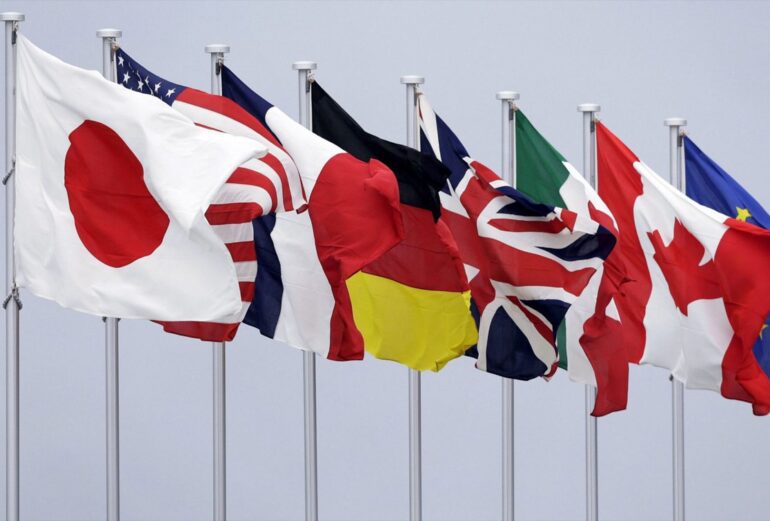TL;DR:
- G7 leaders call for the development and adoption of technical standards to ensure trustworthy AI.
- The governance of AI technology has not kept pace with its growth, prompting the need for universal standards.
- The European Union is moving closer to passing comprehensive AI legislation, potentially setting a global precedent.
- The G7 emphasizes that rules for digital technologies should align with shared democratic values.
- Quantum leaps in AI, such as generative AI, raise opportunities and challenges that need immediate attention.
- Different nations, including the US, Japan, and China, have varying approaches to AI governance.
- The G7 leaders agree to establish the “Hiroshima AI process,” a ministerial forum to discuss generative AI issues.
- International organizations, like the OECD, are urged to analyze the impact of policy developments in AI.
- The EU and the US plan to exchange views on emerging technologies during the Trade and Technology Council.
- The G7 seeks to adopt “risk-based” AI rules and foster a global consensus on AI challenges and opportunities.
Main AI News:
Leaders of the Group of Seven (G7) nations, convening in Hiroshima, Japan, have voiced the need for concerted efforts in developing and embracing technical standards to ensure the trustworthiness of artificial intelligence (AI). In a joint statement, the G7 leaders acknowledged the disparity in approaches toward achieving the common objective of trustworthy AI, emphasizing that regulations pertaining to digital technologies, including AI, should align with shared democratic values.
This call for action comes in the wake of the European Union’s recent progress in crafting comprehensive legislation to govern AI technology. The proposed AI law, set to be the world’s first of its kind, could potentially establish a precedent for advanced economies worldwide. Ursula von der Leyen, President of the European Commission, emphasized the significance of accuracy, reliability, safety, and non-discrimination in AI systems, irrespective of their origin.
Recognizing the opportunities and challenges associated with generative AI, a subset of AI popularized by the ChatGPT application developed by OpenAI, the G7 leaders expressed the need to proactively assess and address these concerns. Concerns over the societal risks posed by the rapid advancement of AI prompted Elon Musk, OpenAI, and a group of AI experts to call for a six-month moratorium on the development of more powerful AI systems. Similarly, EU lawmakers urged global leaders to implement measures to govern AI technologies, which are progressing at an accelerated pace.
While the United States has adopted a cautious approach to AI governance, with President Joe Biden expressing reservations about the potential dangers posed by AI, Sam Altman, CEO of Microsoft-backed OpenAI, suggested considering licensing and testing requirements for the development of AI models during a Senate panel discussion. In contrast, Japan, as this year’s G7 chair, has taken a more accommodating stance, pledging support for both public and industrial adoption of AI while diligently monitoring associated risks. Prime Minister Fumio Kishida stressed the importance of striking a balance between the potentials and risks of AI during discussions with the government’s AI council.
Notably, the G7 nations’ approaches to AI regulation differ significantly from China’s more restrictive policies. China’s cyberspace regulator recently introduced draft measures aligning generative AI-powered services with the country’s core socialist values.
While acknowledging divergent perspectives on AI regulation, the G7 leaders agreed to establish a ministerial forum called the “Hiroshima AI process.” This forum aims to facilitate discussions on issues related to generative AI, such as copyrights and disinformation, by the end of this year. Furthermore, the G7 leaders urged international organizations like the Organisation for Economic Cooperation and Development to conduct analyses on the impact of policy developments in the AI realm.
Conlcusion:
The G7’s emphasis on developing universal technical standards for AI and fostering a global consensus on AI governance carries significant implications for the market. The establishment of trustworthy AI through standardized regulations aligning with democratic values can enhance consumer confidence, encourage innovation, and drive market growth. The EU’s comprehensive AI legislation and the G7’s commitment to addressing the challenges and opportunities of emerging AI technologies signal a proactive approach to responsible AI development.
Businesses operating in this market should closely monitor these developments and align their strategies with evolving regulatory frameworks to capitalize on the potential of AI while mitigating risks. The G7’s collaborative efforts pave the way for a market environment that fosters innovation, fairness, and societal benefits, positioning businesses for long-term success in the AI landscape.

